人教版(2019)选择性必修 第一册Unit 2 Looking into the Future Learning About Language 课件(共33张PPT)
文档属性
| 名称 | 人教版(2019)选择性必修 第一册Unit 2 Looking into the Future Learning About Language 课件(共33张PPT) |  | |
| 格式 | pptx | ||
| 文件大小 | 3.3MB | ||
| 资源类型 | 教案 | ||
| 版本资源 | 人教版(2019) | ||
| 科目 | 英语 | ||
| 更新时间 | 2024-07-22 21:58:04 | ||
图片预览


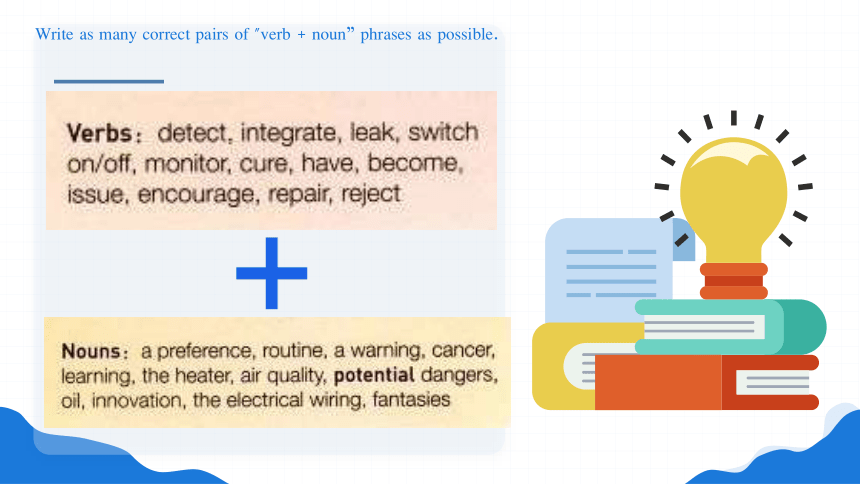
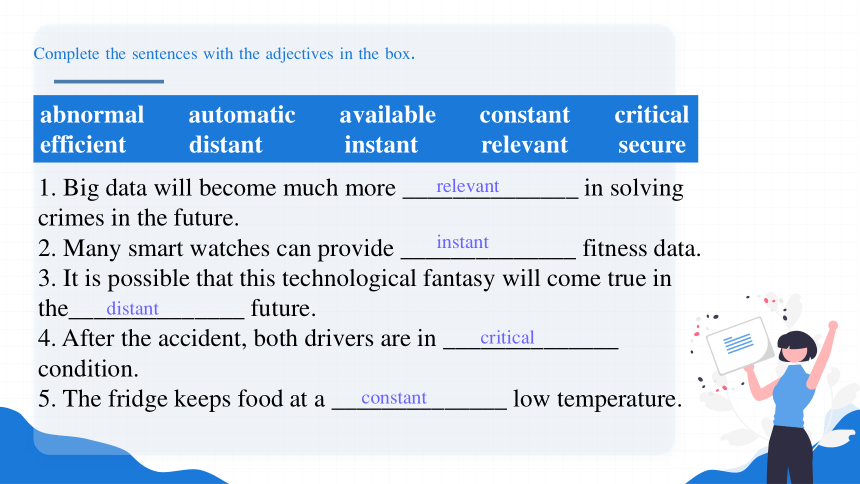
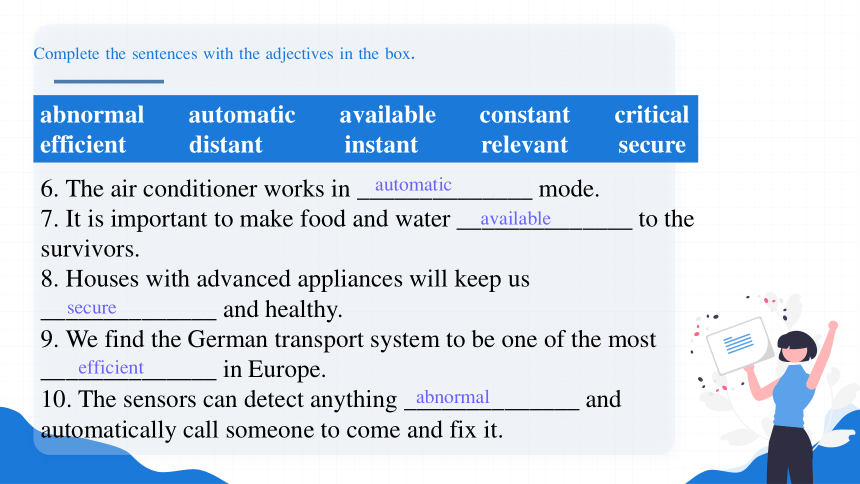
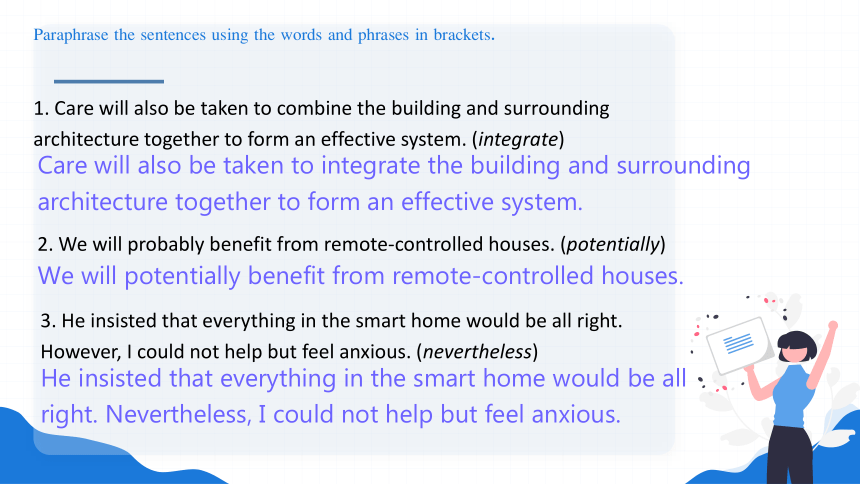
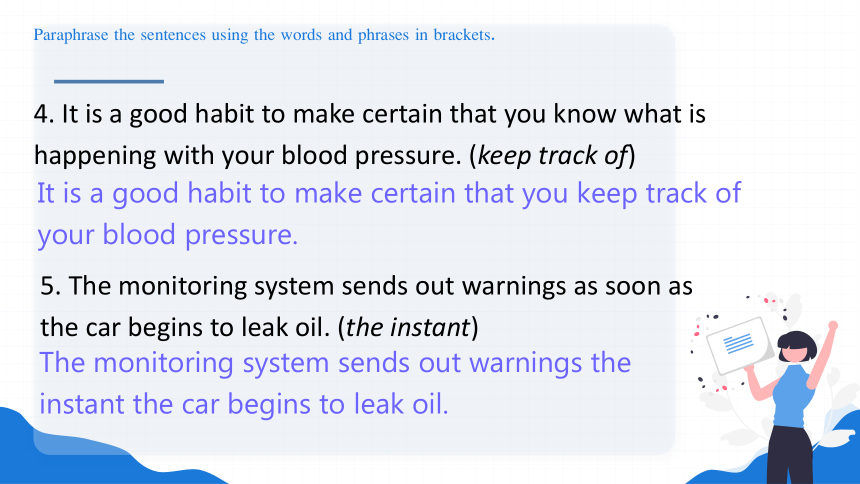
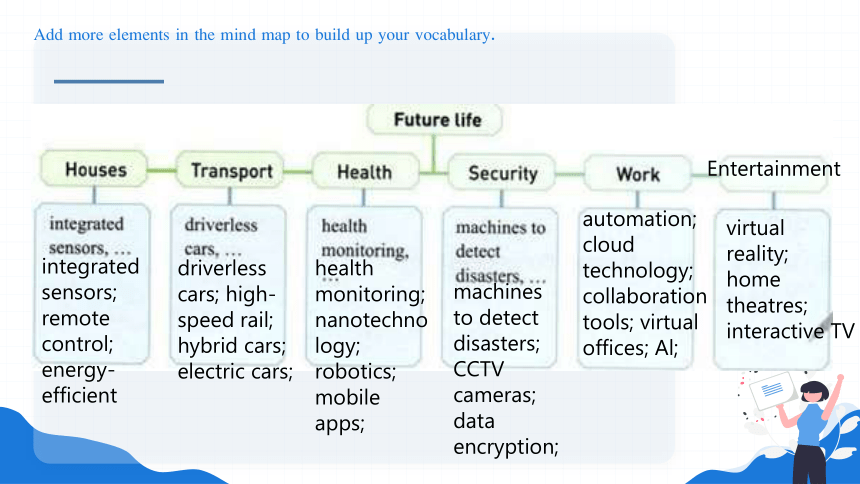

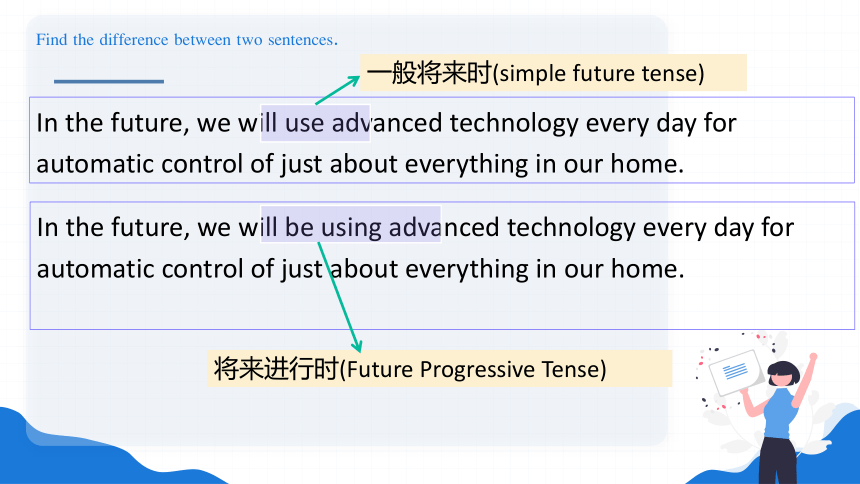
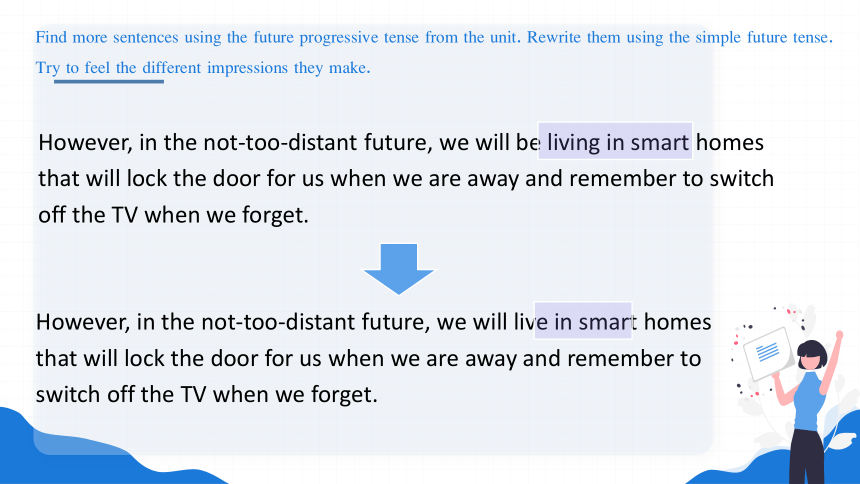

文档简介
(共33张PPT)
Unit 2
Looking into the Future
Learning About Language
01
Build up your vocabulary
Write as many correct pairs of "verb + noun” phrases as possible.
Complete the sentences with the adjectives in the box.
abnormal automatic available constant critical
efficient distant instant relevant secure
1. Big data will become much more ______________ in solving crimes in the future.
2. Many smart watches can provide ______________ fitness data.
3. It is possible that this technological fantasy will come true in the______________ future.
4. After the accident, both drivers are in ______________ condition.
5. The fridge keeps food at a ______________ low temperature.
relevant
instant
critical
distant
constant
Complete the sentences with the adjectives in the box.
abnormal automatic available constant critical
efficient distant instant relevant secure
6. The air conditioner works in ______________ mode.
7. It is important to make food and water ______________ to the survivors.
8. Houses with advanced appliances will keep us ______________ and healthy.
9. We find the German transport system to be one of the most ______________ in Europe.
10. The sensors can detect anything ______________ and automatically call someone to come and fix it.
automatic
available
secure
efficient
abnormal
Paraphrase the sentences using the words and phrases in brackets.
1. Care will also be taken to combine the building and surrounding architecture together to form an effective system. (integrate)
Care will also be taken to integrate the building and surrounding architecture together to form an effective system.
2. We will probably benefit from remote-controlled houses. (potentially)
We will potentially benefit from remote-controlled houses.
3. He insisted that everything in the smart home would be all right. However, I could not help but feel anxious. (nevertheless)
He insisted that everything in the smart home would be all right. Nevertheless, I could not help but feel anxious.
Paraphrase the sentences using the words and phrases in brackets.
4. It is a good habit to make certain that you know what is happening with your blood pressure. (keep track of)
It is a good habit to make certain that you keep track of your blood pressure.
5. The monitoring system sends out warnings as soon as the car begins to leak oil. (the instant)
The monitoring system sends out warnings the instant the car begins to leak oil.
Add more elements in the mind map to build up your vocabulary.
integrated sensors; remote control; energy-efficient
driverless cars; high-speed rail; hybrid cars; electric cars;
health monitoring; nanotechnology; robotics; mobile apps;
machines to detect disasters; CCTV cameras; data encryption;
automation; cloud technology; collaboration tools; virtual offices; Al;
Entertainment
virtual
reality;
home
theatres; interactive TV
02
Discover useful structures
Find the difference between two sentences.
In the future, we will use advanced technology every day for automatic control of just about everything in our home.
In the future, we will be using advanced technology every day for automatic control of just about everything in our home.
一般将来时(simple future tense)
将来进行时(Future Progressive Tense)
Find more sentences using the future progressive tense from the unit. Rewrite them using the simple future tense. Try to feel the different impressions they make.
However, in the not-too-distant future, we will be living in smart homes that will lock the door for us when we are away and remember to switch off the TV when we forget.
However, in the not-too-distant future, we will live in smart homes that will lock the door for us when we are away and remember to switch off the TV when we forget.
Find more sentences using the future progressive tense from the unit. Rewrite them using the simple future tense. Try to feel the different impressions they make.
In addition, your smart home will be monitoring your health for you every day.
In addition, your smart home will monitor your health for you every day.
What different impressions do these sentences make
一般将来时 VS 将来进行时
1. 一般将来时(simple future tense):will+动词原形,表示个人对于未来事件的主观意愿或许诺,语气较为直接;
将来进行时(future progressive tense):will+be+现在分词,表示事情的发展,是一种必然趋势,具有客观性,表达了说话者的期待之情,语气较为委婉,有时用来表示委婉地提出请求或者表达其他含义。
A: Will you be passing the post office 你将会经过邮局吗?
B: Probably. Why 可能吧。怎么了?
A: I need some stamps. 我需要些邮票。
B: OK. I’ll get some for you. 好吧,我给你买回来。
一般将来时 VS 将来进行时
2. 一般将来时具有其他的意味;
而将来进行时有时只单纯表示将来或按计划进行的事。试比较:
I’ll work on this tomorrow.
明天我要做这件事。(表示意愿,也可能表示许诺)
I’ll be working on this tomorrow.
明天我将做这件事。(表示将来,意思是按计划进行)
Will you join us for dinner
你来和我们一起吃饭好吗?(发出邀请)
Will you be joining us for dinner
你会和我们一起吃饭吗?(表示将来,询问计划)
将来进行时
概念
将来进行时主要表示将来某一时刻正在进行的动作,或表示在将来某一段时间正在进行的动作;预测将来会发生的事情或将来的某种可能;也常用来表示委婉的语气。
This time tomorrow they will be playing bowling or softball.
明天这个时候他们正在打保龄球或垒球。
(表将来正在进行)
将来进行时
概念
You will be making a mistake.
你会犯错误的。
Will you be staying here long
你将在这儿待很长时间吗
(表委婉)
(表预测)
将来进行时
构成
将来进行时由“will +be + 现在分词”构成,如果主语为第一人称,偶尔用 shall。
陈述式 一般疑问式
I/We will/shall (not) be doing ... Will/Shall I/we (not) be doing ...
You/They will (not) be doing ... Will you/they (not) be doing ...
He/She/It will (not) be doing ... Will he/she/it (not) be doing ...
将来进行时
基本用法
表示将来某一时刻正在进行的动作,一般带时间状语。
1.The train will be leaving in a minute.
火车很快就要开了。
2. In the future, we will be using advanced technology every day for automatic control of just about everything in our home.
在未来,我们将每天使用先进技术对家中几乎一切东西进行自动化控制。
将来进行时
基本用法
表示将来某一时刻正在进行的动作,一般带时间状语。
3. She will be taking care of the outpatient while you are away.
你不在时她将照顾这名门诊病人。
4. We shall not be cycling to work this time next week.
下周这个时候我们就不骑自行车上班了。
5. Do come tomorrow! We’ll be expecting you.
明天务必来,我们会等你的。
将来进行时
基本用法
将来进行时像现在进行时一样,可以表示已计划好的事。
1. We will be taking a test at this time tomorrow.
明天这时我们将在考试。
2. Don’t call me between 12:30 and 13:00. I will be taking a nap.
中午12点半到1点之间不要给我打电话,我那时在午休。
3. We shall be going to London next week.
下周我们要去伦敦。
将来进行时
基本用法
表示现在正在进行的动作,但这个动作会延续到将来。
4. I think that the doctor will be working on the surgery until tomorrow morning.
我认为那位医生会做这台外科手术直到明天早上。
1. Tomorrow I will be flying to the disaster area.
明天我要飞往灾区。
表示预定的将来的动作或对将来的预测。
2. After you take the medicine, you will be feeling much better.
服过药后你会感觉好多了。
03
Practice
Read the passage and complete the following sentences.
Jack goes to school every weekday. He leaves home at 6:45 and arrives at school at about 7:30. His morning classes begin at 8:00 and continue until 12:15. Then he has lunch, which takes about half an hour. His classes begin again at 1:30 in the afternoon and end at 3:50. He goes to the school’s football club at 4:30 and finishes practice at 6:00. He arrives home at about 6:45. Every day he follows the same routine and tomorrow will be no exception.
1. At 6:30 a.m. tomorrow, ________.
A. he’ll be leaving the house
B. he’ll be at home
B
Read the passage and complete the following sentences.
Jack goes to school every weekday. He leaves home at 6:45 and arrives at school at about 7:30. His morning classes begin at 8:00 and continue until 12:15. Then he has lunch, which takes about half an hour. His classes begin again at 1:30 in the afternoon and end at 3:50. He goes to the school’s football club at 4:30 and finishes practice at 6:00. He arrives home at about 6:45. Every day he follows the same routine and tomorrow will be no exception.
A
2. At 8:10 a.m. tomorrow, ________.
A. he’ll be having a class
B. he’ll have a class
Read the passage and complete the following sentences.
Jack goes to school every weekday. He leaves home at 6:45 and arrives at school at about 7:30. His morning classes begin at 8:00 and continue until 12:15. Then he has lunch, which takes about half an hour. His classes begin again at 1:30 in the afternoon and end at 3:50. He goes to the school’s football club at 4:30 and finishes practice at 6:00. He arrives home at about 6:45. Every day he follows the same routine and tomorrow will be no exception.
3. At 12:30 tomorrow, ________.
A. he’ll be having lunch
B. he’ll have lunch
A
Read the passage and complete the following sentences.
Jack goes to school every weekday. He leaves home at 6:45 and arrives at school at about 7:30. His morning classes begin at 8:00 and continue until 12:15. Then he has lunch, which takes about half an hour. His classes begin again at 1:30 in the afternoon and end at 3:50. He goes to the school’s football club at 4:30 and finishes practice at 6:00. He arrives home at about 6:45. Every day he follows the same routine and tomorrow will be no exception.
A
4. At 5:00 p.m. tomorrow, ________.
A. he’ll be practising football
B. he’ll practise football
Read the passage and complete the following sentences.
Jack goes to school every weekday. He leaves home at 6:45 and arrives at school at about 7:30. His morning classes begin at 8:00 and continue until 12:15. Then he has lunch, which takes about half an hour. His classes begin again at 1:30 in the afternoon and end at 3:50. He goes to the school’s football club at 4:30 and finishes practice at 6:00. He arrives home at about 6:45. Every day he follows the same routine and tomorrow will be no exception.
A
5. At 6:45 p.m. tomorrow, ________.
A. he’ll be arriving home
B. he’ll arrive home
Fill in the blanks with the proper forms of the verbs in brackets.
1. You can call me then. I ___________________ (not sleep).
2. They set off at 9:00 a.m. and thought they _____________ (reach) the airport an hour later.
3. Will you _______________ (wait) for me until I find the electrical wires
4. Better not hang out with Sam then. He _________________ (work) on his article on critical thinking.
5. I guess most parents _______________ (support) the new plan at the meeting tomorrow.
won't be sleeping
would reach
wait
will be working
will support
04
Language
Points
potential
adj. 可能的;潜在的
n. 潜在性;可能性;潜能
the potential for (doing) sth.
(做)某事的可能性/潜力
have the potential to do sth. 有潜力做某事
achieve/fulfil/ realize one's (full) potential
发挥某人的(全部)潜能
练习:In my judgement, she has the potential ___________ (defeat) Hanks and become a champion.
to defeat
combine
v.(使)结合;混合
combine with 与……结合起来
combine A and/with B 把A和B结合起来
combination n. 结合;联合;混合
in combination with 与……结合
练习:Hydrogen combines __________ oxygen to form water.
with
SEE YOU
NEXT TIME
Unit 2
Looking into the Future
Learning About Language
01
Build up your vocabulary
Write as many correct pairs of "verb + noun” phrases as possible.
Complete the sentences with the adjectives in the box.
abnormal automatic available constant critical
efficient distant instant relevant secure
1. Big data will become much more ______________ in solving crimes in the future.
2. Many smart watches can provide ______________ fitness data.
3. It is possible that this technological fantasy will come true in the______________ future.
4. After the accident, both drivers are in ______________ condition.
5. The fridge keeps food at a ______________ low temperature.
relevant
instant
critical
distant
constant
Complete the sentences with the adjectives in the box.
abnormal automatic available constant critical
efficient distant instant relevant secure
6. The air conditioner works in ______________ mode.
7. It is important to make food and water ______________ to the survivors.
8. Houses with advanced appliances will keep us ______________ and healthy.
9. We find the German transport system to be one of the most ______________ in Europe.
10. The sensors can detect anything ______________ and automatically call someone to come and fix it.
automatic
available
secure
efficient
abnormal
Paraphrase the sentences using the words and phrases in brackets.
1. Care will also be taken to combine the building and surrounding architecture together to form an effective system. (integrate)
Care will also be taken to integrate the building and surrounding architecture together to form an effective system.
2. We will probably benefit from remote-controlled houses. (potentially)
We will potentially benefit from remote-controlled houses.
3. He insisted that everything in the smart home would be all right. However, I could not help but feel anxious. (nevertheless)
He insisted that everything in the smart home would be all right. Nevertheless, I could not help but feel anxious.
Paraphrase the sentences using the words and phrases in brackets.
4. It is a good habit to make certain that you know what is happening with your blood pressure. (keep track of)
It is a good habit to make certain that you keep track of your blood pressure.
5. The monitoring system sends out warnings as soon as the car begins to leak oil. (the instant)
The monitoring system sends out warnings the instant the car begins to leak oil.
Add more elements in the mind map to build up your vocabulary.
integrated sensors; remote control; energy-efficient
driverless cars; high-speed rail; hybrid cars; electric cars;
health monitoring; nanotechnology; robotics; mobile apps;
machines to detect disasters; CCTV cameras; data encryption;
automation; cloud technology; collaboration tools; virtual offices; Al;
Entertainment
virtual
reality;
home
theatres; interactive TV
02
Discover useful structures
Find the difference between two sentences.
In the future, we will use advanced technology every day for automatic control of just about everything in our home.
In the future, we will be using advanced technology every day for automatic control of just about everything in our home.
一般将来时(simple future tense)
将来进行时(Future Progressive Tense)
Find more sentences using the future progressive tense from the unit. Rewrite them using the simple future tense. Try to feel the different impressions they make.
However, in the not-too-distant future, we will be living in smart homes that will lock the door for us when we are away and remember to switch off the TV when we forget.
However, in the not-too-distant future, we will live in smart homes that will lock the door for us when we are away and remember to switch off the TV when we forget.
Find more sentences using the future progressive tense from the unit. Rewrite them using the simple future tense. Try to feel the different impressions they make.
In addition, your smart home will be monitoring your health for you every day.
In addition, your smart home will monitor your health for you every day.
What different impressions do these sentences make
一般将来时 VS 将来进行时
1. 一般将来时(simple future tense):will+动词原形,表示个人对于未来事件的主观意愿或许诺,语气较为直接;
将来进行时(future progressive tense):will+be+现在分词,表示事情的发展,是一种必然趋势,具有客观性,表达了说话者的期待之情,语气较为委婉,有时用来表示委婉地提出请求或者表达其他含义。
A: Will you be passing the post office 你将会经过邮局吗?
B: Probably. Why 可能吧。怎么了?
A: I need some stamps. 我需要些邮票。
B: OK. I’ll get some for you. 好吧,我给你买回来。
一般将来时 VS 将来进行时
2. 一般将来时具有其他的意味;
而将来进行时有时只单纯表示将来或按计划进行的事。试比较:
I’ll work on this tomorrow.
明天我要做这件事。(表示意愿,也可能表示许诺)
I’ll be working on this tomorrow.
明天我将做这件事。(表示将来,意思是按计划进行)
Will you join us for dinner
你来和我们一起吃饭好吗?(发出邀请)
Will you be joining us for dinner
你会和我们一起吃饭吗?(表示将来,询问计划)
将来进行时
概念
将来进行时主要表示将来某一时刻正在进行的动作,或表示在将来某一段时间正在进行的动作;预测将来会发生的事情或将来的某种可能;也常用来表示委婉的语气。
This time tomorrow they will be playing bowling or softball.
明天这个时候他们正在打保龄球或垒球。
(表将来正在进行)
将来进行时
概念
You will be making a mistake.
你会犯错误的。
Will you be staying here long
你将在这儿待很长时间吗
(表委婉)
(表预测)
将来进行时
构成
将来进行时由“will +be + 现在分词”构成,如果主语为第一人称,偶尔用 shall。
陈述式 一般疑问式
I/We will/shall (not) be doing ... Will/Shall I/we (not) be doing ...
You/They will (not) be doing ... Will you/they (not) be doing ...
He/She/It will (not) be doing ... Will he/she/it (not) be doing ...
将来进行时
基本用法
表示将来某一时刻正在进行的动作,一般带时间状语。
1.The train will be leaving in a minute.
火车很快就要开了。
2. In the future, we will be using advanced technology every day for automatic control of just about everything in our home.
在未来,我们将每天使用先进技术对家中几乎一切东西进行自动化控制。
将来进行时
基本用法
表示将来某一时刻正在进行的动作,一般带时间状语。
3. She will be taking care of the outpatient while you are away.
你不在时她将照顾这名门诊病人。
4. We shall not be cycling to work this time next week.
下周这个时候我们就不骑自行车上班了。
5. Do come tomorrow! We’ll be expecting you.
明天务必来,我们会等你的。
将来进行时
基本用法
将来进行时像现在进行时一样,可以表示已计划好的事。
1. We will be taking a test at this time tomorrow.
明天这时我们将在考试。
2. Don’t call me between 12:30 and 13:00. I will be taking a nap.
中午12点半到1点之间不要给我打电话,我那时在午休。
3. We shall be going to London next week.
下周我们要去伦敦。
将来进行时
基本用法
表示现在正在进行的动作,但这个动作会延续到将来。
4. I think that the doctor will be working on the surgery until tomorrow morning.
我认为那位医生会做这台外科手术直到明天早上。
1. Tomorrow I will be flying to the disaster area.
明天我要飞往灾区。
表示预定的将来的动作或对将来的预测。
2. After you take the medicine, you will be feeling much better.
服过药后你会感觉好多了。
03
Practice
Read the passage and complete the following sentences.
Jack goes to school every weekday. He leaves home at 6:45 and arrives at school at about 7:30. His morning classes begin at 8:00 and continue until 12:15. Then he has lunch, which takes about half an hour. His classes begin again at 1:30 in the afternoon and end at 3:50. He goes to the school’s football club at 4:30 and finishes practice at 6:00. He arrives home at about 6:45. Every day he follows the same routine and tomorrow will be no exception.
1. At 6:30 a.m. tomorrow, ________.
A. he’ll be leaving the house
B. he’ll be at home
B
Read the passage and complete the following sentences.
Jack goes to school every weekday. He leaves home at 6:45 and arrives at school at about 7:30. His morning classes begin at 8:00 and continue until 12:15. Then he has lunch, which takes about half an hour. His classes begin again at 1:30 in the afternoon and end at 3:50. He goes to the school’s football club at 4:30 and finishes practice at 6:00. He arrives home at about 6:45. Every day he follows the same routine and tomorrow will be no exception.
A
2. At 8:10 a.m. tomorrow, ________.
A. he’ll be having a class
B. he’ll have a class
Read the passage and complete the following sentences.
Jack goes to school every weekday. He leaves home at 6:45 and arrives at school at about 7:30. His morning classes begin at 8:00 and continue until 12:15. Then he has lunch, which takes about half an hour. His classes begin again at 1:30 in the afternoon and end at 3:50. He goes to the school’s football club at 4:30 and finishes practice at 6:00. He arrives home at about 6:45. Every day he follows the same routine and tomorrow will be no exception.
3. At 12:30 tomorrow, ________.
A. he’ll be having lunch
B. he’ll have lunch
A
Read the passage and complete the following sentences.
Jack goes to school every weekday. He leaves home at 6:45 and arrives at school at about 7:30. His morning classes begin at 8:00 and continue until 12:15. Then he has lunch, which takes about half an hour. His classes begin again at 1:30 in the afternoon and end at 3:50. He goes to the school’s football club at 4:30 and finishes practice at 6:00. He arrives home at about 6:45. Every day he follows the same routine and tomorrow will be no exception.
A
4. At 5:00 p.m. tomorrow, ________.
A. he’ll be practising football
B. he’ll practise football
Read the passage and complete the following sentences.
Jack goes to school every weekday. He leaves home at 6:45 and arrives at school at about 7:30. His morning classes begin at 8:00 and continue until 12:15. Then he has lunch, which takes about half an hour. His classes begin again at 1:30 in the afternoon and end at 3:50. He goes to the school’s football club at 4:30 and finishes practice at 6:00. He arrives home at about 6:45. Every day he follows the same routine and tomorrow will be no exception.
A
5. At 6:45 p.m. tomorrow, ________.
A. he’ll be arriving home
B. he’ll arrive home
Fill in the blanks with the proper forms of the verbs in brackets.
1. You can call me then. I ___________________ (not sleep).
2. They set off at 9:00 a.m. and thought they _____________ (reach) the airport an hour later.
3. Will you _______________ (wait) for me until I find the electrical wires
4. Better not hang out with Sam then. He _________________ (work) on his article on critical thinking.
5. I guess most parents _______________ (support) the new plan at the meeting tomorrow.
won't be sleeping
would reach
wait
will be working
will support
04
Language
Points
potential
adj. 可能的;潜在的
n. 潜在性;可能性;潜能
the potential for (doing) sth.
(做)某事的可能性/潜力
have the potential to do sth. 有潜力做某事
achieve/fulfil/ realize one's (full) potential
发挥某人的(全部)潜能
练习:In my judgement, she has the potential ___________ (defeat) Hanks and become a champion.
to defeat
combine
v.(使)结合;混合
combine with 与……结合起来
combine A and/with B 把A和B结合起来
combination n. 结合;联合;混合
in combination with 与……结合
练习:Hydrogen combines __________ oxygen to form water.
with
SEE YOU
NEXT TIME
